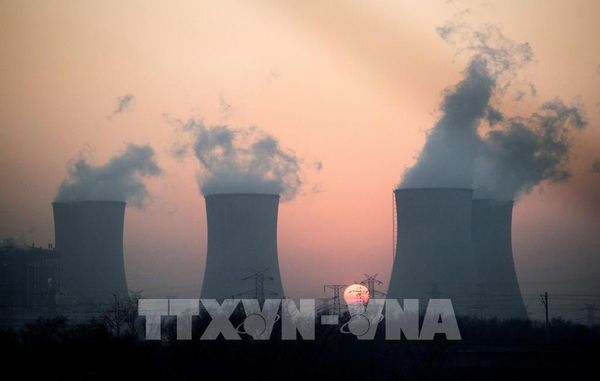Developing the carbon market, moving towards Net Zero
- Người viết: Gia Định Group lúc
- Events
The carbon market is considered the solution and key to achieving the Net Zero goal for Vietnam in the coming time.
The market operates on the principle that "polluters" must pay a fee to compensate for emissions into the environment through the trading and exchange of carbon credits. The state receives budget revenue when it applies fees from the exchange of quotas, carbon credits or carbon taxes in the future.

Net zero emissions or "Net Zero" is Vietnam's strong political commitment at COP26. Photo: AFP/TTXVN
* Promoting green transformation for businesses
Net zero or "Net Zero" is Vietnam's strong political commitment at the 26th United Nations Framework Convention on Climate Change (COP26). To solve the above challenges, the Government of Vietnam has issued a legal framework to synchronously implement solutions and set out strategies and goals in the future, including developing a development policy framework. carbon market.
Net zero or "Net Zero" is Vietnam's strong political commitment at the 26th United Nations Framework Convention on Climate Change (COP26). To solve the above challenges, the Government of Vietnam has issued a legal framework to synchronously implement solutions and set out strategies and goals in the future, including developing a development policy framework. carbon market.
Net zero or "Net Zero" is Vietnam's strong political commitment at the 26th United Nations Framework Convention on Climate Change (COP26). To solve the above challenges, the Government of Vietnam has issued a legal framework to synchronously implement solutions and set out strategies and goals in the future, including developing a development policy framework. carbon market.Mr. Vu Minh Ly, Deputy Director of the Center for Communication of Natural Resources and Environment (Ministry of Natural Resources and Environment), said that Vietnam will lose about 10 billion USD in 2020, equivalent to 3.2% of GDP due to the impacts of climate change. of climate change. The total economic costs of climate change could reach $523 billion by 2050. Notably, Vietnam has quadrupled its per capita greenhouse gas emissions this century, and is maintaining the fastest growth rate in the world. This situation pushes Vietnam to act strongly, responsibly and without delay to protect the environment.
Participating in the carbon market is both a responsibility and an opportunity for organizations and businesses. The market follows the "buy-and-sell" rule. The State collects the budget when applying fees from the exchange of quotas, carbon credits or carbon taxes in the future. These fees will be renewable for projects and research works on carbon emission reduction, sequestration and storage, etc. Meanwhile, the carbon seller benefits from the units that perform well in environmental solutions. , the buyer will also be able to offset emissions exceeding the allowed quota. Thereby, efforts on solutions to reduce emissions, absorb carbon, and green solutions are applied in production, business and service activities.
The Ministry of Natural Resources and Environment is developing a draft project "Developing the carbon market in Vietnam". Accordingly, by 2025, Vietnam will start piloting and by 2028 will officially operate a carbon credit exchange.
In Vietnam, the domestic carbon market includes activities of exchanging greenhouse gas emission quotas and carbon credits obtained from domestic and international carbon credit exchange and offsetting mechanisms in accordance with Vietnam's regulations. international laws and treaties to which Vietnam is a member. According to the Environmental Protection Law 2020, carbon credits are certificates that can be traded and represent the right to emit one ton of CO2 or one ton of CO2 equivalent. The Ministry of Natural Resources and Environment has the leading role and coordinates with relevant ministries to organize pilot operation and official operation of the carbon credit exchange to serve the management, monitoring and supervision of the carbon market; regulate activities connecting the domestic carbon credit exchange with regional and world carbon markets; regulate the implementation of carbon credit exchange and offset mechanisms; Develop propaganda materials and carry out capacity building activities for carbon market participants.
On June 30, the Ministry of Natural Resources and Environment approved the project document "Implementing the carbon market in Vietnam". The Department of Climate Change is the project owner. The project is sponsored by the World Bank with Total investment: 5 million USD (reciprocal 71,851 USD arranged by the Ministry of Natural Resources and Environment from the annual state budget), implementation period from 1999. 2024 to 2028. The project aims to support Vietnam in developing a carbon market, designing and implementing carbon credit exchange and offsetting and a greenhouse gas emission quota exchange system.
Deputy Director of the Department of Climate Change (Ministry of Natural Resources and Environment) Nguyen Tuan Quang said that the Ministry has issued Circular No. 17/2022/TT-BTNMT regulating measurement, reporting and mitigation techniques. greenhouse gas emissions and greenhouse gas inventory in the waste management sector. Accordingly, businesses in the waste sector must carry out the responsibility of providing data and information related to serving greenhouse gas inventories; Organize the implementation of greenhouse gas inventories and prepare periodic inventory reports every 2 years from 2024 onwards. At the same time, these enterprises must develop and implement measures to reduce greenhouse gas emissions in the period from 2023 - 2025 in accordance with the production and business conditions of the establishment. Currently, the whole country has 1,912 establishments that must carry out greenhouse gas inventories according to Decision No. 01/2022/QD-TTg on the List of fields and establishments emitting greenhouse gases that must carry out greenhouse gas inventories. The list of establishments that must report inventory is updated every 2 years. The Ministry of Natural Resources and Environment is currently updating it to issue a new List in 2024. Therefore, businesses need to develop measures to reduce now to meet the requirements of reducing greenhouse gas emissions from 2026, otherwise it may lead to production stagnation. This is also the basis for businesses to participate in the carbon market and increase financial resources for reinvestment.
